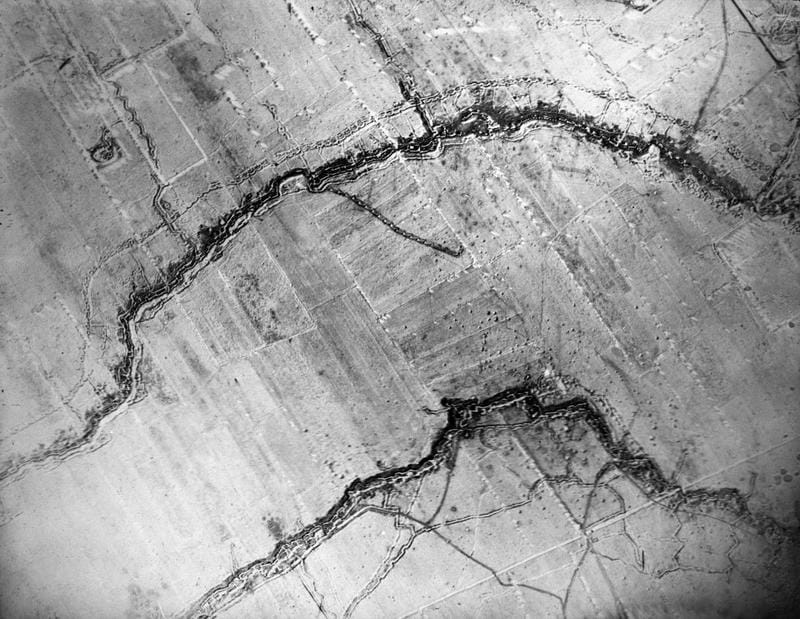World War I

World War I was one of the most destructive wars in the world's history. It involved most of the world, which was why it was called a world war.
This war had its beginnings in the assassination of Archduke Franz Ferdinand, the heir apparent to the Austro-Hungarian Empire's throne, in Bosnia by a Serbian terrorist. Austria-Hungary blamed the Serbian government for knowing about the plot and assisting the murder. Austria-Hungary gained the support of Germany, but were hesitant of attacking Serbia because of its powerful ally, Russia.
Austria-Hungary sent Serbia an ultimatum in which Serbia had to cede its sovereignty, which they rejected. On 28 July 1914, Austria-Hungary declared war with Serbia, even though their army wasn't ready to fight the Serbians. Both Russia and Germany mobilized to help their allies, and on the first of August, Germany declared war on Russia, and two days later, on France. Germany invaded Belgium as a first step to defeating France, and Britain came to the help of Belgium.
Some other causes of the First World War were the increasing imperialistic and militaristic policies in Europe and the alliances formed by the nations involved in the war.
Causes
#1: Imperialism
By the beginning of WWI, Britain and France were already empires, controlling vast swatches of land throughout the world. Other countries, like Germany, wanted to expand, and this put them in a contest of land-grabbing throughout Asia and Africa that made these nations into competitors.
#2: Militarism
The construction of HMS Dreadnought, a very effective battleship, sparked an arms race between Britain and Germany. This led to competition between the two countries, each wanting to have more battleships than the other.
#3: Alliances
Finally, the alliances made between the major powers in WWI helped start the war. The Dual Alliance, made up of Germany and Austria-Hungary, was created to protect the countries from the imposing threat of Russia, and it became the Triple alliance when they invited Italy. The Triple Entente, made up of Britain, France, and Russia, was created to protect each other from Germany.
#4: Serbian Nationalism
Archduke Franz-Ferdinand wanted to give more autonomy to the Slavic people in the Austro-Hungarian Empire, which included Bosnia and Herzegovina. Serbia was an independent country under the protection of the Russian Empire. The Serbian nationalists wanted to unite all Serbians, including those living in Bosnia and Herzegovina and in other parts of the Austro-Hungarian Empire, and they could not do this if Franz-Ferdinand went through with his plan, so they decided to assassinate him.
Warfare
Trench Warfare
Trench warfare was a tactic used by most of the countries fighting on the Western Front in WWI. It consists of digging long defensive trenches at least 2.5 meters deep, in which troops can shelter during attacks. To attack from a trench, troops would have to climb out, run across no man's land (terrain that was in range of the enemies' field guns) past enemy fire, and into their trenches.
The Battle of Verdun
The Battle of Verdun was the longest battle of WWI. Fought between the French and the Germans near the city of Verdun in north-eastern France, this battle lasted from 21 February – 18 December 1916, almost ten months. In the end, the French managed to drive the German army out, forcing them to relocate to the Somme River. This battle came to be viewed as a symbol of French determination in recovering their land from the Germans and the destructiveness of the war.
American Involvement
Originally, most Americans did not want to enter the war because it did not affect them. America was across the Atlantic Ocean, and they were not threatened by the developments in Europe. However, certain events occurred that pushed America to enter the war.
The Lusitania
The Lusitania was a British cruise ship sunk off the coast of Ireland by a German U-boat in 1915. As well as passengers, the Lusitania was carrying a large amount of ammunition for allied forces. 123 Americans died in the wreck, which became one of the reasons for U.S. involvement.
Submarine Warfare
In 1917, Germany declared unrestricted submarine warfare, which meant that any ship supplying England or France would be fair game for the U-boats. Some of the ships sunk were American – another reason for U.S. involvement.
The Zimmerman Note
The final straw came in the Zimmerman note, a telegraph sent from Germany to the Mexican government promising them funding that would help them take back Texas and some other American land if they joined the Germans.
America's involvement in WWI was significant, as over two million troops were eventually sent to Europe.
Belleau Wood
In June 1918, American, French, and British forces at Belleau Wood drove back the most advanced German position in their army. The German divisions, who had come from the Eastern Front, wanted to take this area before the American forces were fully deployed, but they were unable to, and the fresh American forces were able to defeat the Germans, who were tired after battles on the Eastern Front.
The Treaty of Versailles
The allied countries called the "Big Three" included the United States, Britain, and France. They created the Treaty of Versailles.
American President Woodrow Wilson wanted to avoid what he saw as the reasons for the war with his fourteen points. The Fourteen Points were not put into practice because the other two of the "Big Three" nations did not agree with them, thinking the terms were too lenient.
It might have been a good idea to treat Germany more leniently so that they would not retaliate, which they did, in WWII.
The German government had to agree to the terms of the Treaty of Versailles because they were losing the war. The German public, who called the treaty the Diktat, or "dictated peace" felt that they had been stabbed in the back by their government. However, the treaty had to be accepted, as if they would have tried to continue the war, harsher terms would have been imposed.
One of these terms was that Germany's military had to be greatly reduced, being limited to a navy of just six battleships with 15,000 men to crew them, 15,000 infantry, and no air force.




